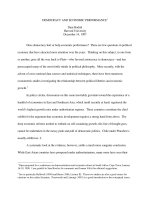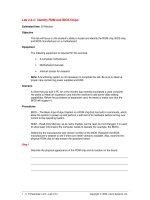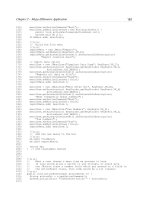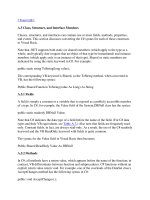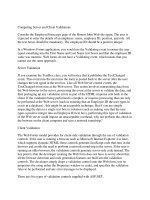Tài liệu Corruption, Democracy and Economic Growth docx
Bạn đang xem bản rút gọn của tài liệu. Xem và tải ngay bản đầy đủ của tài liệu tại đây (103.58 KB, 16 trang )
Corruption, Democracy, and Economic Growth
A. C
OOPER
D
RURY
, J
ONATHAN
K
RIECKHAUS
,
AND
M
ICHAEL
L
USZTIG
A
BSTRACT
. Scholars have long suspected that political processes such as
democracy and corruption are important factors in determining
economic growth. Studies show, however, that democracy has only
indirect effects on growth, while corruption is generally accepted by
scholars as having a direct and negative impact on economic perfor-
mance. We argue that one of democracy’s indirect benefits is its ability to
mitigate the detrimental effect of corruption on economic growth.
Although corruption certainly occurs in democracies, the electoral
mechanism inhibits politicians from engaging in corrupt acts that
damage overall economic performance and thereby jeopardize their
political survival. Using time-series cross-section data for more than 100
countries from 1982–97, we show that corruption has no significant
effect on economic growth in democracies, while non-democracies suffer
significant economic harm from corruption.
Keywords: • Corruption • Democracy • Economic growth • Political
economy • States
It is no great insight to proclaim that liberal democracies tend to be wealthier than
non-democracies. Since the end of World War II, a great deal of scholarly effort
has gone into exploring the relationship between economic growth and liberal
democracy, with many pursuing an obvious explanation for their association,
namely that democracy facilitates wealth by stimulating economic growth.
1
While
intuitively appealing, reality suggests the relationship is more complicated.
Indeed, a number of studies find no direct, statistically significant relationship
between democracy and economic growth, although democracy appears to have
important indirect influences on growth, due to its positive effect on such things as
educational expenditure, life expectancy, and political stability (Baum and Lake,
2003; Helliwell, 1994; Kurzman et al., 2002). This does not put an end to the
matter, of course. It simply suggests that greater understanding is needed of the
apparently symbiotic role played between the most robust system of government
International Political Science Review (2006), Vol 27, No. 2, 121–136
DOI: 10.1177/0192512106061423 © 2006 International Political Science Association
S
AGE
Publications (London, Thousand Oaks, CA and New Delhi)
ever developed (Fukuyama, 1992) and the economic growth and efficiency that
appears to sustain it.
We attempt to enhance the understanding of the indirect effects that democ-
racy has on economic growth. Although our focus is on just one of these indirect
effects, it is one that, as is clear from the discussion below, is substantively
important and exists worldwide to varying degrees. We concentrate on political
corruption, which is present in all regimes, albeit at differing levels. We are hardly
the first to delve into the role that corruption plays with respect to economic
growth. As the literature review below suggests, some argue that corruption has
beneficial effects for an economy. We disagree, and while this disagreement is
somewhat intuitive, some of our findings are unexpected and shed new light on
the connection between democracy and economic performance.
In this article, we use time-series cross-section data from 100 countries over a 16-
year period and find, rather intuitively, that corruption has a significant, negative
impact on economic performance in non-democracies. Our unique contribution,
however, is to explore further these relationships by examining democracy’s
indirect effects on economic growth. Our expectation (discussed below) is that
democracy will mitigate the negative effects of corruption, since the electoral
mechanism allows citizens to evict politicians that engage in particularly damaging
forms of corruption. Democracy, in other words, may exhibit no direct statistical
relationship with economic growth, but it clearly serves to militate against the
negative economic effects of corruption.
The Effects of Corruption and Democracy on Economic Growth
We now turn to a discussion of corruption’s effect on economic growth and then
explain how democracy ameliorates this effect.
The Ill Effects of Corruption
We define corruption “as the abuse of public office for private gain,” whether
pecuniary or in terms of status. The gain may accrue to an individual or a group,
or to those closely associated with such an individual or group. Corrupt activity
includes bribery, nepotism, theft, and other misappropriation of public resources
(see Bardhan, 1997: 1321; Lambsdorff, 1999: 3–4; Nye, 1967: 419; Shleifer and
Vishny, 1993: 599). The predominant, although not exclusive, view of corruption
is that it is damaging to economic performance as both a tax on productivity and a
market distortion.
Mauro (1995) finds empirically that corruption reduces private sector invest-
ment even in countries featuring cumbersome economic regulations, where
corruption might be expected to spur investment. Shleifer and Vishny (1993)
suggest that one reason for this is that corruption is more than simply a tax on
economic activity, primarily because there is no central mechanism for collection.
Instead, rapacious consumers of graft may be innumerable. Post-communist
Russia illustrates the point nicely:
To invest in a Russian company, a foreigner must bribe every agency involved in
foreign investment, including the foreign investment office, the relevant
industrial ministry, the finance ministry, the executive branch of the local
government, the legislative branch, the central bank, the state property bureau,
122 International Political Science Review 27(2)
and so on. The obvious result is that foreigners do not invest in Russia.
(Shleifer and Vishny, 1993: 615; see also Bardhan, 1997: 1324–6)
Rose-Ackerman (1996) also argues that corruption generates more distortion than
does mere taxation. Just as an incentive to bribe exists, one to receive bribes also
exists. Put differently, there is an underappreciated supply-side to the market for
rent-seeking. One manifestation is that policymakers may promote initiatives
(public works projects are an excellent example) not to satisfy social need, but
because such projects increase opportunities for bribes.
Moreover, as the literature on rent-seeking and directly unproductive activity
suggests, the construction of a market for political influence and favors generates
high opportunity costs in that it dissipates resources that could otherwise be used
on productive activity (Bhagwati, 1982; Brooks and Heijdra, 1988; Krueger, 1974;
Lien, 1990; Tullock, 1967). Thus, corruption draws off funds that would otherwise
be available for economic growth.
The other view of corruption suggests that while corruption itself may be
deplorable and unethical to moralists, its effects need not be economically
detrimental. Leff (1968) argues that where government sets for itself the task of
economic modernization (dictatorships of the right or left are excellent exam-
ples) graft may promote economic growth. That is, graft provides an alternative
channel to influence for private sector interests otherwise not well represented
(Nye, 1967: 420). Huntington (1968: 69) states it even more boldly: “the only
thing worse than a society with a rigid, overcentralized, dishonest bureaucracy is
one with a rigid, overcentralized, honest bureaucracy.”
Corruption also can be economically beneficial because it tends to favor the
most efficient firms. Many forms of corruption take the form of the sale of limited
commodities (whether these are policies, import licenses, or firm-specific favors,
supply may be assumed to be low and demand high). As such, a crude market for
favors emerges, with the richest (and perhaps most efficient) firms most able to
outbid their rivals. Weaker firms must become more efficient to compete in this
black market, or exit the productive sector (Leff, 1968). The success of these
firms, moreover, provides a broader base of taxation and public spending,
assuming at least some of the monies are reinvested by the state (Nye, 1967: 420).
Even those that do argue that corruption has economic benefits do not suggest
that corruption is efficient per se. Among others, Leff (1968) characterizes
corruption as a tax on economic activity; few see taxes as spurs to economic
growth. Rather, their point is that, under some circumstances, corruption is more
efficient than the alternative.
In sum, the literature on the economic effects of corruption yields two
positions. The first, more traditional and accepted position is that corruption has
few virtues: it renders otherwise good government bad and bad government
worse, it dissipates resources that could be used productively, and generates suffi-
ciently high transaction costs to limit significantly investment. The second view is
that corruption serves to create an economic equilibrium in states that are
excessively bureaucratic, rationalizing the weakest firms from the marketplace and
substituting private-sector economic decision-making for that provided by the
state. This second position is problematic because it does not consider the
incentive for all officials to get into the corruption game, the result of which is
excessive taxation on productivity. Further, most of those arguing the benefits of
corruption regularly point out that it is not the ideal, but perhaps better than a
D
RURY
/K
RIECKHAUS
/L
USZTIG
: Corruption, Democracy, and Economic Growth 123
rigid, inefficient bureaucracy. Therefore, we hold that corruption will have a
negative impact on GDP growth, holding other factors constant.
We now turn to the discussion of democracy and economic performance,
where we argue that democracy has the indirect benefit of mitigating corruption’s
harmful impact on an economy.
The Indirect Benefit of Democracy
As a type of government, democracy is touted as having many benefits, both
political and economic. The economic benefits are not entirely clear, however.
Several writers have argued that democracy has positive effects on economic
growth for a variety of reasons. First, democracy allows for the eviction of bad
leaders. North (1990), for instance, argues that authoritarian elites will prey upon
societies unless constrained by democratic institutions. Bueno de Mesquita et al.
(2001) similarly argue that authoritarian leaders have few checks on their power
and thus engage in cronyism and corruption. Olson (1993), along with Przeworski
and Limongi (1993), provide analogous, albeit more complicated, arguments.
In addition to this general idea that democracy allows citizens periodically to
evict politicians who hurt the economy, a second and complementary set of
arguments focus on the microeconomic effects of a democratic political climate.
Sirowy and Inkeles (1990: 133–4) nicely summarize these effects:
Overall, the extension and protection of civil liberties and basic freedoms are
thought to generate the security of expectation necessary to motivate citizens
to work, save, and invest . . . In addition, popular political participation not
only has the consequence of breaking down the privilege and vested interests
of a few but also feeds a participative mentality that carries over into the
economic arena and greatly increases the flow of information so essential to
effective and efficient governments. In sum, political pluralism acts to release
energies and foster conditions conducive to change, entrepreneurial risk, and
economic development.
Third, Lipset (1959, 1960) argues that a symbiotic relationship between wealth
and democracy exists. Specifically, he suggests that democracy is most likely to
occur in an industrialized society in which wealth is generated by a large number
of (middle-class) industrial producers. In turn, the middle class retains a strong
stake in a system that provides sufficient freedom of choice (political and eco-
nomic) to permit the creation of more wealth.
The more pessimistic view of democracy is rooted in an older literature. This
pessimistic view was popularized by Samuel Huntington, who argued that in newly
democratic developing countries, citizen demands will rapidly escalate and gener-
ate high levels of government spending. Huntington and Nelson (1976: 23) argue
that one response is that “political participation must be held down, at least
temporarily, in order to promote economic development.” Similar arguments can
be found in the literature on East Asia, which generally suggests that authoritarian
regimes better avoid rent-seeking and politically motivated policy mistakes
(Haggard, 1990). In sum, democracies are argued to reduce the surplus available
for investment, with a consequent negative effect on economic growth.
A second critique of democracy stems from the neoclassical political-economy
literature. Olson, for instance, argues that special interest groups tend unduly to
124 International Political Science Review 27(2)
influence state policy, reaping particularistic privileges that damage the overall
economy. Olson (1982) argues that as a democracy ages, it becomes more plural-
istic and consequently less efficient. This “political” inefficiency leads to decreased
economic performance. Simply put, in older democracies there is more time for
interest groups to overcome the difficulties associated with collective action
(Olson, 1982). As a result, there are ever-more demands on the resources of the
state. Moreover, because the democratic state reflects, at least to some degree, the
political make-up of its constituents, there are more voices represented in
government, leading to political sclerosis. The result is decreased governmental
efficiency and, therefore, decreased economic performance (see also Bell, 1976;
Brittan, 1975; Schmitter and Karl, 1991). Scholars in the developmental state
tradition develop this argument in depth, arguing that authoritarian regimes,
especially in East Asia, are better able to resist special interest groups’ distributive
demands and rent-seeking pressures (Amsden, 1989; Evans, 1995; Wade, 1990).
Finally, Przeworski and Limongi (1993) resurrect the 19th-century argument
that democracy undermines the security of property rights by providing the dispo-
ssessed with a powerful political tool for expropriating the wealth of property-
holders, a result that could lead to considerable economic uncertainty and thus
lower economic growth.
While both positive and negative findings have been argued, the more recent
empirical literature suggests that neither perspective is accurate, or perhaps both
are accurate and they balance each other out. Using different methodologies and
a fairly sophisticated set of techniques for dealing with endogeneity, both Helliwell
(1994) and Przeworski et al. (2000) conclude that there is simply no statistically
significant relationship between democracy and growth.
This does not mean, however, that democracy has no significant impact on
growth at all. Instead, democracy has no direct effect on growth, but scholars are
increasingly realizing that democracy does have important indirect effects.
Democracy, for instance, is more likely to lead to greater spending on education
and health, both of which facilitate economic growth (Baum and Lake, 2003;
Helliwell, 1994). Moreover, democracy facilitates political stability, which is also
known to be good for economic growth.
We further pursue this insight that democracy might have important indirect
effects, especially pertaining to corruption. Our argument is grounded in one
interesting variant of the compatibility perspective, namely the claim that
democracy facilitates growth since citizens are better able to remove corrupt
politicians (Bueno de Mesquita et al., 2001; North, 1990). We argue, by extension,
that democracy may not merely reduce the level of corruption, but also change
the composition of corruption.
Our argument rests upon two plausible assumptions. First, politicians weigh the
costs and benefits of specific acts of corruption when they are faced with the
choice of engaging in an illicit act. Corrupt behavior yields obvious benefits, inclu-
ding both personal enrichment and the ability to gain political support from those
groups benefiting from corruption. These potential benefits exist for most
politicians in most political systems.
Corruption also entails costs, however. Our second assumption is that these
costs vary substantially across types of corruption and types of political system. The
cost to politicians is primarily determined by how a given act of corruption hurts
particular societal actors, and how capable those actors are of responding to this
damage through the political system. The ability of the society to react is largely
D
RURY
/K
RIECKHAUS
/L
USZTIG
: Corruption, Democracy, and Economic Growth 125
determined by regime type. In authoritarian systems, as Bueno de Mesquita et al.
(2001) note, the supporting or ruling coalition is relatively small. Consequently,
the costs of corrupt behavior imposed upon the majority of the population can be
safely ignored. Given that authoritarian leaders will not suffer retribution from
society, they can engage in extremely costly forms of corruption. A good example
of such systematic corruption is Zaire from 1962 to 1994, where Mobuto allowed
90 percent of the road network to erode away, deciding quite rationally that this
severe misallocation of resources from infrastructure to corruption would not
threaten his ability to maintain power (Evans, 1995).
In democratic systems, citizens can remove politicians and, therefore, both the
level and composition of corruption will be lower. Corrupt activities that impose a
large cost on society will annoy voters, which is costly for politicians. When these
costs outweigh the benefits of any given corrupt act, politicians will be deterred
from corruption. This will reduce the total number of corrupt activities in a
democracy. More interesting, for our purposes, is that this reduction in corruption
will not be even across all forms of corruption. Instead, politicians will avoid those
types of corruption that cost society dearly, given that such acts are most likely to
have severe political consequences – namely, removal from office. Corruption that
impedes important investments in physical infrastructure and education will not
be pursued because the political costs outweigh the benefits. However, less costly
forms of corruption, such as nepotism or bribes for expedited access to govern-
ment officials, may continue unabated because the benefits continue to outweigh
the minor political costs.
In sum, our expectation is that at any given level of corruption, the effect of that
corruption on economic growth will be lower in a democracy than under author-
itarian rule. A democracy might experience high levels of corruption, but this
corruption will be restricted to those activities and sectors that have relatively little
impact on national economic performance because voters will definitely act to
remove politicians that engage in significant growth-impairing corruption. This
ability to punish elected officials provides a powerful incentive for politicians to
confine their corrupt activities to economically irrelevant activities.
This is a rather common-sense intuition, but it has interesting implications for
the relationships between democracy, corruption, and growth. Our expectation is
that corruption will have a negative effect on growth in authoritarian regimes, as
per conventional theory, but we believe that in a democracy this negative effect
will be much weaker, because citizens will demand that politicians at least keep
their corrupt behavior from influencing what is probably the most important
means of legitimacy in modern nations – economic growth.
Data
We now turn to a discussion of the data we use to test our argument. The data are
arrayed as a time-series cross-section of more than 100 countries for 16 years
(1982–97). Summary statistics for the data appear in Table 1. Our dependent
variable, growth of GDP, is measured by the World Bank’s World Development
Indicators (2003).
For our first independent variable, corruption, we rely on the International
Country Risk Guide’s (ICRG) assessment of corruption in a wide range of
countries between 1982 and 1997. The index ranges from six to zero, with lower
scores indicating that:
126 International Political Science Review 27(2)
